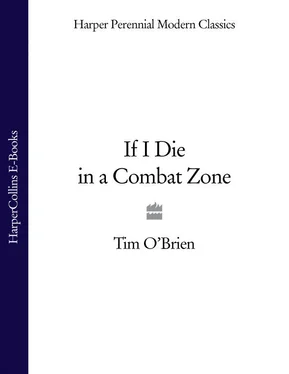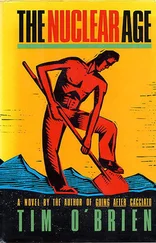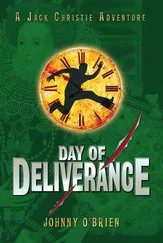Mad Mark came over. ‘Hey, shut the hell up, you two.’ He left.
‘Here, I’ll take the first watch,’ Bates said. I gave him the starlight scope, but he put it aside and cradled his rifle in his arms and peered out at the dark. ‘Night,’ he said.
To understand what happens to the GI among the mine fields of My Lai, you must know something about what happens in America. You must understand Fort Lewis, Washington. You must understand a thing called basic training. A college graduate in May 1968, I was at Fort Lewis in mid-August. One hundred of us came. We watched one another’s hair fall, we learned the word ‘sir’, we learned to react to ‘To duh rear, HARCH!’ Above us the sixty-mile-distant mountain stood to the sky, white and shivering cold. The mountain was named Rainier, and it stood for freedom.
I made a friend, Erik, and together he and I stumbled like galley slaves through the first months of army life.
I was not looking for friendship at Fort Lewis. The place was too much the apotheosis of all nightmares about army life; the people were boors, a whole horde of boors – trainees and drill sergeants and officers, no difference in kind. In that jungle of robots there could be no hope of finding friendship; no one could understand the brutality of the place. I did not want a friend, that was how it stood in the end. If the savages had captured me, they would not drag me into compatibility with their kind. Laughing and talking of hometowns and drag races and twin-cammed racing engines – all this was for the others. I did not like them, and there was no reason to like them. For the other trainees, it came too easy. They did more than adjust well; they thrived on basic training, thinking they were becoming men, joking at the bullyism, getting the drill sergeants to joke along with them. I held my own, not a whisper more. I hated my fellows, my bunk mates and cell mates. I hated the trainees even more than the captors. I learned to march, but I learned alone. I gaped at the neat package of stupidity and arrogance at Fort Lewis. I was superior. I made no apologies for believing it. Without sympathy or compassion, I instructed my intellect and eyes: ignore the horde. I kept vigil against intrusion into my private life. I maintained a distance suitable to the black and white distinction between me and the unconscious, genuflecting herd.
I mouthed the words, shaping my lips and tongue just so, perfect deception. But no noise came out. The failure to bellow ‘Yes, Drill Sergeant!’ was a fist in the bastard’s face. A point for the soul. Standing in formation after chow, I learned to smoke. It was a private pleasure. I needed my lungs and my personal taste buds and my own hands and thoughts. I seemed older, wiser, removed, more confident.
I maintained silence. I thought about a girl. After thinking, she became a woman, only months too late. I spent time comparing her hair to the colour of sand just at dusk. That sort of thing.
I counted the number of soldiers I would trade for her. I memorized. I memorized details of her smell, knowing that without the work the details would be lost.
I memorized her letters, whole letters. Memorizing was a way to remember and a way to forget, a way to remain a stranger, only a visitor at Fort Lewis. I memorized a poem she sent me. It was a poem by Auden, and marching for shots and haircuts and clothing issue, I recited the poem, forging Auden’s words with thoughts I pretended to be hers. I lied about her, pretending that she wrote the poem herself, for me. I compared her to characters out of books by Hemingway and Maugham. Without ever knowing her – she would have me make the qualification boldly – I imagined she was made of the hardness of Lady Brett, of the fickle and spiritual in Rosy, and of the earthiness of Adams’ girl in the mountains. In her letters she claimed I created her out of the mind. The mind, she said, can make wonderful changes in the real stuff. So I hid from the drill sergeants, turned my back on the barracks, and wrote back to her.
I thought a little about Canada, I thought about refusing to carry a rifle.
I grew tired of independence.
One evening I asked Erik what he was reading. His shoes were shined, and he had his footlocker straight, and with half an hour before lights out, he was on his back looking at a book. Erik. Skinny, a deep voice, dressed in olive drab, calm. He said it was The Mint . ‘T. E. Lawrence. You know – Lawrence of Arabia. He went through something like this. You know, something like basic training. It’s a sort of how-to-do-it book.’ He said he was just paging through it, that he’d read the whole thing before, and he gave it to me. With The Mint I became a soldier, knew I was a soldier. I succumbed. Without a backward glance at privacy, I gave in to soldiering. I took on a friend, betraying in a sense my wonderful suffering.
Erik talked about poetry and philosophy and travel. But he talked about soldiering, too. We formed a coalition. It was mostly a coalition against the army, but we aimed also at the other trainees. The idea, loosely, was to preserve ourselves. It was a two-man war of survival, and we fought like guerrillas, jabbing in the lance, drawing a trickle of army blood, running like rabbits. We hid in the masses. Right under their bloodshot eyes. We exposed them, even if they were blind and deaf to it. We’d let them die of anaemia, a little blood at a time. It was a war of resistance; the objective was to save our souls. Sometimes it meant hiding the remnants of conscience and consciousness behind battle cries, pretended servility, bare, clench-fisted obedience. Our private conversations were the cornerstone of the resistance, perhaps because talking about basic training in careful, honest words was by itself an insult to army education. Simply to think and talk and try to understand was evidence that we were not cattle or machines.
Erik pretended sometimes that he lacked the fundamental courage of the men of poetry and philosophy whom he read during the first nights in Fort Lewis.
‘I was in Denmark when they drafted me. I did not want to come back. I wanted to become a European and write some books. There was even a chance for romance over there. But I come from a small town, my parents know everyone, and I couldn’t hurt and embarrass them. And, of course, I was afraid.’
Perhaps it was cowardice and perhaps it was good sense. Anyway, Erik and I rarely brought our war into the offensive stage, and when we were so stupid as to try, we were massacred like mice. One morning Erik cornered the company drill sergeant, a man named Blyton, and demanded an appointment, a private talk. Blyton hustled Erik through a door.
Erik informed him of his opposition to the Vietnam war. Erik explained that he believed the war was without just reason, that life ought not to be forfeited unless certain and fundamental principles are at stake, and not unless those principles stand in certain danger.
Erik did not talk to me about the episode for a week or more. And when he did talk, he only said that Blyton laughed at him and then yelled and called him a coward.
‘He said I was a pansy. It’s hard to argue, I suppose. I’m not just intellectually opposed to violence, I’m absolutely frightened by it. It’s impossible to separate in my mind the gut fear from pure reason. I’m really afraid that all the hard, sober arguments I have against this war are nothing but an intellectual adjustment to my horror at the thought of bleeding to death in some rice paddy.’
Blyton did not forget Erik, and we had to take the guerrilla war to the mountain for a while. We were good boys, good soldiers. We assumed a perfect, tranquil mediocrity. We returned to our detached, personal struggle.
Читать дальше












